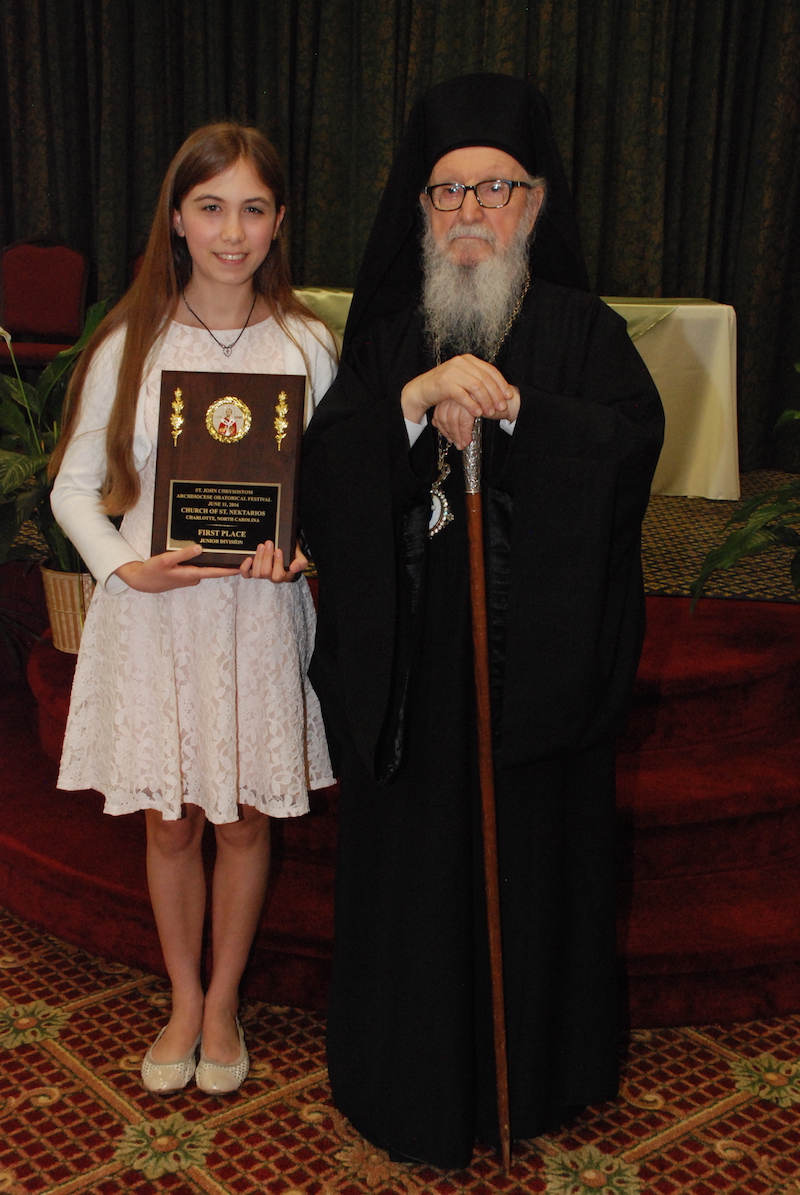This article is from PRAXIS volume 16, issue 1: "Parish as Educator"
Eirene Stavropoulos was the first place junior division finalist in the 2016 St. John Chrysosotom National Oratorical Festival, held in Charlotte, North Carolina. Her speech was published in PRAXIS magazine and is available in full below. Read more about the event here.
Topic #1: In the Old Testament we read that there is "a time to keep silence and a time to speak" (Ecclesiastes 3:7). What is the value of silence and quiet ina time when we are always "plugged in"?
The average person spends eight hours and forty-one minutes on electronic devices daily. That is twenty minutes more than an average person’s total amount of sleep. We live in a world where we are constantly “plugged in” due to continuous advancements in technology. On top of that, our everyday lives are already jam-packed with activities such as lessons, meetings, sports and jobs. Finding the time to have a moment of silence is becoming harder and harder, which provides a struggle for us as Orthodox Christians who deeply value silence. Silence allows us to quiet our minds and form a connection with God. But how do we achieve this silence in the chaos of our daily lives? Thankfully, Orthodoxy gives us a great tool to help us—prayer. Through prayer, we can achieve both physical and spiritual silence and, in doing so, grow closer to God.
The Church teaches us that there is a powerful link between prayer and silence. St. Mark the Ascetic explains this connection, saying that “the intellect cannot be still unless the body is still also; and the wall between them cannot be demolished without stillness and prayer.” When we pray, we become still in mind and body, giving us a break from the noisy issues that afflict us during the day. As a musician, I have plenty of these noisy issues. Between musical rehearsals and cello, piano and voice lessons, I often find myself extremely overwhelmed when it comes to balancing my music and schoolwork. After all my homework is complete and I am worn out, it is refreshing to have evening prayer with my family. The final portion of this evening prayer is done in complete silence, allowing me to reflect on my day. In the same way, when a piece of music is finished, there is also a slight moment of silence so that the piece can sink in and take root inside the listeners. In order for God to take root inside of us, we too must end our days with silence.
Taking time out of our day to practice physical silence is an easy concept to comprehend, but how can we achieve spiritual silence? Ascetics who have willfully separated themselves from the world’s distractions can help us answer this question. One such example, Abbot Ephraim of Vatopedi Monastery on Mt. Athos, explains that “for all Christians, especially the monks, silence is important. But this does not mean only ‘don’t speak.’ Mainly, silence, from the theological point of view, is the concentration of all the inner powers, in the mind, in the heart and the inner union of our nous.” Abbot Ephraim is telling us that the goal of balancsilence, for every Christian, is to unify our mind, heart and soul and focus them on God. However, this is no easy task. The Church understands this and provides us with a specific prayer to help us: the Jesus Prayer. The Jesus Prayer takes less than five seconds to say, but those five seconds contain the key to developing a strong connection with God. In this prayer, we beg God to forgive us, humble ourselves before Him and recognize our sinful nature. “Lord Jesus Christ, Son of God, have mercy on me, a sinner.” Through this admission, we become capable of directing our mind, heart and soul by crying out to be saved.
In Ecclesiastes 3:7 it states that there is “a time to keep silence and a time to speak.” With so much crowding up our lives, it is extremely important that we find our own time for daily silence when we can communicate with God through prayer rather than with friends on our phones. In doing so, we can disconnect ourselves from our temporal problems and connect ourselves to God. If we can incorporate time for “silence” into our busy lives both physically and spiritually, God will grace us, and we will have the hope of attaining something greater than a text message—life everlasting.
Like what you’re reading? Visit the Religious Education Department to view back issues of PRAXIS and learn how to subscribe. You may also contact the Department of Religious Education by phone at (646) 519–6300 or by email at [email protected].